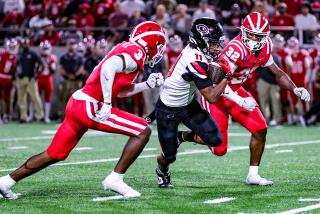HANDLE WITH CARE : When He’s Injury-Free, Cal Tailback Richards Is Force to Be Reckoned With
- Share via
BERKELEY — Chris Richards, another in a series of major-college running backs off the assembly line at San Fernando High School, is running out of warranty at Cal.
Damaged body parts are a recurring problem for Richards, a senior tailback.
The latest chip in his chassis is a bruised shoulder. He was held out of last week’s 44-13 loss to Washington State but is listed as probable for Saturday’s Pacific 10 Conference game here against UCLA.
Richards has become a regular on Cal’s injury report. He missed parts of five games last season with a variety of injuries, the most significant a sprained ankle that he aggravated almost weekly.
Listed at 5 feet 11 inches and 185 pounds, he is the typical flashy little compact--great acceleration, elusive in traffic but questionable in a collision.
And therein lies the problem, because Richards, who leads Cal rushers with 370 yards, loves playing demolition derby on the field.
“People say his running style has something to do with him always being injured,” said Ollie Wilson, who coaches Cal’s running backs. “I say that has everything to do with it. He’s reckless, completely devoid of fear, which means his judgment is sometimes clouded as far as knowing when to go down.”
Actually, Richards said, judgment has nothing to do with it. Where there is a choice of trying to run through or around defenders, he is fairly consistent.
“I attack,” he said. “To me, that’s what offense should be. It’s like what Walter Payton said, ‘Before I let a player get into me, I get into him.’ It’s something I live by.”
Richards learned to play aggressively while growing up with five sisters and three brothers in Lake View Terrace, at the north end of the San Fernando Valley.
“We taught each other, in fighting each other and other people, not to turn away,” Richards said.
He also ran with a rough crowd that included gang members and drug dealers. Staying out of trouble, he said, meant taking a firm stand.
“You were tested,” Richards said. “You had to hold your ground. My out was being an athlete.”
Richards said his friends understood that there would be times when he would have to distance himself.
“They knew Chris wasn’t going to ditch class,” Richards said. “They knew that Chris wasn’t going to drink, because Chris had to go to school to play football. That was the difference between us.”
At San Fernando, a school with a history of outstanding running backs, Richards fell right in line. He scored 28 touchdowns, averaged more than 7 yards a carry and made the All-City team 3 times. And he hoped to continue his career at USC, as San Fernando graduates Anthony Davis, Lynn Cain and Charles White had.
The Trojans were ready to oblige. There was only one hitch. They wanted to move him to receiver.
Richards moved, all right, but it wasn’t to receiver. He went all the way to Oklahoma to play for the Sooners. His stay, however, was short-lived.
He made Oklahoma’s traveling squad in 1984 as a freshman but played sparingly and carried only once for 2 yards.
Richards enjoyed his surroundings about as much as his allotment of playing time. He recalls searching for a high school football game to watch after practice.
“In Southern California, you could follow the stadium lights to find a game,” he said. “Well, we see some lights and follow them, get out of the car, and it’s a rodeo. A rodeo ! I said, ‘Man, we gotta get out of here.’ ”
After attending a junior college in Alameda, Richards came to Cal in 1986. His first few months there were troubled. Richards and three other players were accused of raping a female student at a university dormitory.
No charges were filed, but the players got a lot of media attention. “It was like the biggest thing that happened in Berkeley history, as far as athletics, except for maybe the Big Play,” Richards said, alluding to the fabled 4-man, 5-lateral kickoff return through the Stanford band in 1982.
Richards quietly maintained his innocence, declining to be quoted in newspapers and on television. He said he read the Bible and tried to draw strength from the support of family and friends.
After becoming eligible to play, four games into the season, Richards let his running do his talking. On his fifth carry, he went 67 yards for a touchdown. He finished the season with an average of 86.3 yards rushing per game to lead the team. His efforts were largely wasted, however. Cal finished 2-9, and at the end of the season, Coach Joe Kapp was fired.
In December, 1986, Bruce Snyder, Ram running back coach, was hired to succeed Kapp. In his years with the Rams and as a USC assistant, Snyder had coached Davis, Eric Dickerson and Ricky Bell.
Richards drew a cool first review from his new coach. Snyder publicly questioned whether a runner of Richards’ size could carry the Golden Bear offense.
“I obviously didn’t know him very well,” Snyder says now. “It didn’t take him very long to prove me wrong.”
Richards gained more than 100 yards in each of Cal’s first three games last season before his ankle was injured. He finished with 668 yards rushing, fifth-best in the Pac-10.
Against UCLA, he carried only 4 times, gaining 10 yards. He said a similar performance will not suffice in his final outing against the Bruins.
“When you’re a USC fan, you don’t get along with UCLA,” Richards said. “It’s like at San Fernando, when we played our archrival, Kennedy. The two just don’t mix. The way I feel about UCLA will never change.”
Physically, Richards said he will be “almost 100%” against the Bruins. “My ankle problem has healed and my shoulder feels pretty good,” he said.
He injured his shoulder 2 weeks ago on one of his typical runs against San Jose State. Bouncing off defenders, Richards turned into the path of a linebacker, who hit him before he could protect himself.
He left the game but returned and scored the winning touchdown on an 11-yard run. “(The shoulder) stayed numb, so I figured why not play?” Richards said.
Although his numerous injuries might lead professional teams to question his durability, Richards hopes to play in the National Football League.
Snyder believes Richards will get a chance.
“He’s fast enough. He can catch. And he’s bright enough in terms of assignments and having a feel for the game,” he said. “The question is, how will he hold up against a big tackle as far as pass blocking?”
In any event, Richards said, he will return to the San Fernando area after he graduates from Cal with a degree in English next spring. The guys from the neighborhood would want it that way.
“That’s one of the main things they always said. ‘Hey, Charles White, he never came back to the neighborhood. What’s up with that?’ ” Richards said. “I don’t want them ever saying that about me.
“I’m going to go back, maybe to coach, or to do whatever I can to help out. It’s much harder now growing up than it was when I was there. They got crack going on. So many things. It’s hard to stay focused on school.”
UCLA Notes
UCLA nose guard Jim Wahler is expected to be back in the starting lineup for Saturday’s game against Cal at Berkeley. Wahler, a 3-year starter, was suspended last week by Coach Terry Donahue, in part because of comments he made in an article that appeared last Thursday in The Times. He was held out of Saturday’s game against Oregon State. . . . Sophomore Stacey Elliott, who replaced Wahler in the starting lineup, strained ligaments in his right knee in the Oregon State game and will not be available to play against Cal. . . . Linebacker Eric Smith, who suffered a concussion in last month’s game against Nebraska, is still bothered by blurred vision. Smith will not play until his vision clears, Donahue said. . . . Defensive tackle Brad Bryson, who had reconstructive surgery on his left knee last February, returned to practice this week. . . . Correction: Reserve linebacker Stacy Argo, who also plays on special teams, is the Bruin leader with 43 tackles. Linebacker Chance Johnson, who does not play on special teams, is second with 42.
More to Read
Go beyond the scoreboard
Get the latest on L.A.'s teams in the daily Sports Report newsletter.
You may occasionally receive promotional content from the Los Angeles Times.











